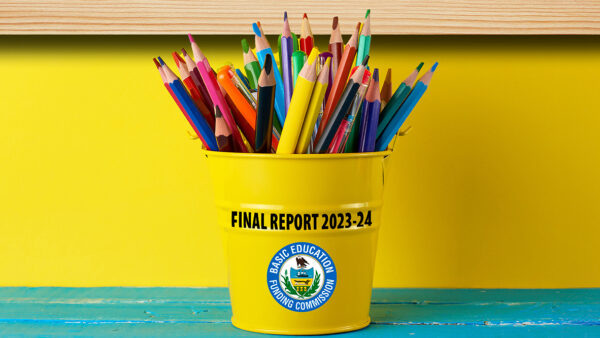
Prioritizes Urgent Needs within Public Education, Maintains Fiscal Responsibility, Avoids Tax Hikes
HARRISBURG – Republicans who serve on the Basic Education Funding Commission unveiled their alternative report (Report #1) today during the final meeting at the state Capitol. According to the Republican lawmakers on the commission, the report provides a roadmap to provide greater budget stability for school districts, ensure students will receive at the least the same amount as the current year’s historic budget allocations, and seek to put in place greater accountability measures for hard-earned tax dollars paying for public education.
Report #1 received 6 favorable votes, 6 negative votes, while 3 members of the commission abstained. A second report, which called for more than $7 billion in new education spending, received 8 favorable votes and 7 negative votes.
Sen. Kristin Phillips-Hill (R-York), co-chair of the commission, was joined by Sens. David G. Argall (R-Schuylkill/Carbon/Luzerne), chairman of the Senate Education Committee, and Greg Rothman (R-Cumberland/Dauphin/Perry), and Reps. Jesse Topper (R-Bedford), Republican chairman of the House Education Committee, Jason Ortitay (R-Washington) and Ryan Warner (R-Fayette) in supporting the comprehensive Report #1.
“Our report is a bold and realistic approach for the legislature and governor to address opportunities within our basic education funding system,” Phillips-Hill said. “This commission gathered testimony from more than 90 individuals at our 14 public hearings and received more than 1,000 comments through the public website. This alternative report is thoughtful, forward-thinking, and will leave basic education in a better place. It is disappointing we could not reach consensus with all of the Democrats, but we believe the recommendations in this report will resonate with students, teachers, parents, and taxpayers without locking our state in for future massive tax hikes at a time when Pennsylvanians can least afford it.”
Report #1 recommends reforms to the state’s Basic Education Funding Formula that will provide greater stability and predictability for school funding, which was a key theme during the commission’s hearings. Additionally, the report encourages that none of the state’s 500 public school districts lose funding based on historic allocations received in the most recently completed state budget.
“This commission heard from hundreds of people from across Pennsylvania asking us to either eliminate or significantly change our unfair and archaic school property tax system,” Argall said. “To me, that is the most important piece of the education funding puzzle.”
The report recommends averaging poverty metrics over a three-year span to avoid drastic budgetary impacts based on small population changes in school districts, which will provide greater predictability for school budgeting officials.
At a commission hearing in Hanover in September, Hannah Barrick, who serves as the executive director of the Pennsylvania Association of School Business Officials, testified, “The most important factor in any formula or funding source is predictability.” Commission members argue that smoothing a critical weight like poverty over a three-year timespan will accomplish Ms. Barrick’s goal and remove volatility for school budgeting officials.
Report #1 does not recommend spending amounts, unlike the Democrats’ report, as Republican commission members caution the impact of forecasted budget shortfalls on current spending levels could warrant tax increases on hard-working Pennsylvanians. They agree that those decisions should be left up to the annual appropriations process, which includes the governor and all legislators.
“Government-run education needs to be accountable to the students and parents who depend on it and to the citizens who pay for it. We need to create opportunities for all students, hold schools accountable for student outcomes and further empower parents in the education of their children,” Rothman said.
Report #1 also highlights efforts as recent as last month to address school infrastructure challenges with a focus on maintenance programs.
“We recognize the need for change in the way education is funded and, through our report, are making recommendations that address the funding formula,” Topper said. “What we are not willing to do is to step outside of our mission as a commission and recommend a specific monetary number. That is the purview of the entirety of the General Assembly and the administration.”
Based on support by Gov. Josh Shapiro, Report #1 recommends assisting students who are trapped in failing schools today with options to pursue educational achievement and opportunities.
“We heard testimony all over Pennsylvania addressing a number of concerns surrounding education,” Ortitay said. “I believe this report provides a balance in providing recommendations for improvement as well as accountability measures to ensure those dollars are being spent in a manner that produces results.”
“Determining the formula that drives out dollars to our school districts is the number one priority of this commission and we have made our recommendations,” Warner said. “We were able to reach consensus on some items found in the report and there are areas of disagreement. It’s now time for the General Assembly to take action on all of these issues.”
The Republicans’ report released today are recommendations to the General Assembly and the governor. The legislature will have the opportunity to review all recommendations made by the commission and begin legislative and budgetary deliberations.
You can access the Report #1 here. More information on the Basic Education Funding Commission can be found here.


